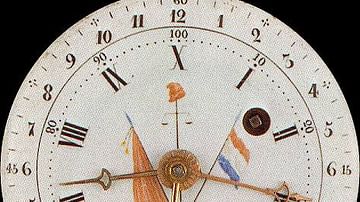Search
Search Results

Image
Map of the Russian Empire under Peter the Great, c. 1725 - Reform, Expansion, and the Birth of Imperial Russia
The expansion and consolidation of the Russian Empire around 1725 marked a fundamental transformation in Russia’s place within Europe and Eurasia. During this period, the Russian state shifted from a relatively inward-looking tsardom into...

Image
Decimal Clock
A decimal clock manufactured during the French Revolution. Decimal time is measured on the inside of the clock while duodecimal time is on the outside, late 18th/early 19th century.

Image
Aztec Sun Stone, 1792 Illustration
Aztec Sun Stone, illustration in Antonio León y Gama's Historical and Chronological Description of the Two Stones Which Were Found in 1790 During the Repaving of the Main Plaza in Mexico, 1792. Antonio León y Gama's (1735-1802) work, published...

Definition
Roman Empire
The Roman Empire, at its height (c. 117), was the most extensive political and social structure in western civilization. Building upon the foundation laid by the Roman Republic, the empire became the largest and most powerful political and...

Definition
Inca Civilization
The Inca civilization flourished in ancient Peru between c. 1400 and 1533 CE. The Inca Empire eventually extended across western South America from Quito in the north to Santiago in the south. It was the largest empire ever seen in the Americas...

Definition
French Revolution
The French Revolution (1789-1799) was a period of major societal and political upheaval in France. It witnessed the collapse of the monarchy, the establishment of the First French Republic, and culminated in the rise of Napoleon Bonaparte...

Definition
Ancient Egyptian Government
The government of ancient Egypt was a theocratic monarchy as the king ruled by a mandate from the gods, initially was seen as an intermediary between human beings and the divine, and was supposed to represent the gods' will through the laws...

Definition
Zhou Dynasty
The Zhou Dynasty (1046-256 BCE) was among the most culturally significant of the early Chinese dynasties and the longest lasting of any in China's history, divided into two periods: Western Zhou (1046-771 BCE) and Eastern Zhou (771-256 BCE...

Definition
Han Dynasty
The Han Dynasty (202 BCE - 220 CE) was the second dynasty of Imperial China (the era of centralized, dynastic government, 221 BCE - 1912 CE) which established the paradigm for all succeeding dynasties up through 1912 CE. It succeeded the...

Definition
Julius Caesar
Gaius Julius Caesar was born 12 July 100 BCE (though some cite 102 as his birth year). His father, also Gaius Julius Caesar, was a Praetor who governed the province of Asia and his mother, Aurelia Cotta, was of noble birth. Both held to the...